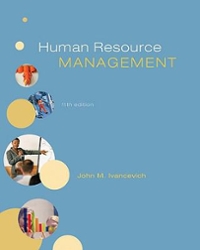Maternity leave occurs when a female employee, upon giving birth to a child, takes time off to
Question:
Maternity leave occurs when a female employee, upon giving birth to a child, takes time off to care for the child. This leave can be either paid or unpaid and is usually limited to six weeks. However, the new mother may decide to take up to six months away from work, though this is almost always without pay. Are there any negative repercussions associated with taking time off to care for an infant? Apparently, the answer is yes. Female employees who participate in maternity leave sometimes feel that their co-workers and supervisors question their commitment to the organization and to their own career progression due to their decision to stop working for a short period of time. Also, co-workers and supervisors sometimes feel overwhelmed with having to deal with the extra work that has to be absorbed from the individual who is taking maternity leave. In extreme cases, these individuals may feel "put upon" or "betrayed" by the once committed individual who is now taking "time off." Of course, anyone who has dedicated themselves to caring for an infant understands very well that such a responsibility is a 24 hours a day, 7 days a week endeavor.
So, what can an individual who is planning to take maternity leave do to ease the tension and misperceptions among her colleagues and supervisor? It is suggested that the pregnant individual create a detailed job analysis that includes which tasks/projects need to be accomplished before she leaves on maternity leave, which tasks/projects can be delegated to which co-workers, and which tasks/projects can wait until she returns from maternity leave.
Though there are many other steps that can be taken to ease the transition between work and maternity leave, the job analysis will help break down and possibly prevent the "maternal wall" from being a barrier to the long-term retention and utilization of a valued employee.
Questions
1. Assume that you (male or female) were going to take a 6-week leave of absence from your job 5 months from now. How do you think your supervisor and co-workers would react to the news? Explain.
2. Do a brief job analysis of your current (or a past) job, including a job description and job specification/qualifications. Which tasks, duties, or responsibilities could you finish before your leave of absence? Which could you delegate to your co-workers? Which would have to wait until you return from the leave of absence?
3. Assume that you received a lot of negative comments from your supervisor and co-workers when you announced that you’d be taking a 6-week leave of absence. How would that make you feel? Would it have any impact on your commitment to the organization?
Step by Step Answer:






